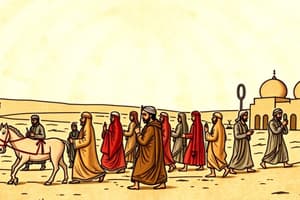Podcast
Questions and Answers
Where was Prophet Muhammad born?
Where was Prophet Muhammad born?
- Cairo, Egypt
- Mecca, Saudi Arabia (correct)
- Jerusalem, Israel
- Baghdad, Iraq
Which of the following is considered one of the Five Pillars of Islam?
Which of the following is considered one of the Five Pillars of Islam?
- Making a pilgrimage to Jerusalem
- Fasting during Ramadan (correct)
- Celebrating Diwali
- Attending church on Sundays
Who is recognized as the final prophet in Islam?
Who is recognized as the final prophet in Islam?
- Muhammad (correct)
- Moses
- Jesus
- Buddha
What is the Muslim holy book that Muslims believe was revealed to Prophet Muhammad?
What is the Muslim holy book that Muslims believe was revealed to Prophet Muhammad?
Which city holds great religious significance in Islam as the birthplace of Prophet Muhammad?
Which city holds great religious significance in Islam as the birthplace of Prophet Muhammad?
What is the core belief at the heart of Islam?
What is the core belief at the heart of Islam?
What are the two main factions that emerged in Islam after Muhammad's death?
What are the two main factions that emerged in Islam after Muhammad's death?
Where is the Ka'aba located, and what does it symbolize during the Hajj pilgrimage?
Where is the Ka'aba located, and what does it symbolize during the Hajj pilgrimage?
Who was the first caliph to guide the emerging Muslim state after Muhammad's death?
Who was the first caliph to guide the emerging Muslim state after Muhammad's death?
Which Muslim figure is known for developing algebra?
Which Muslim figure is known for developing algebra?
How did Islam primarily spread during its expansion?
How did Islam primarily spread during its expansion?
Which Muslim denomination believes that only Ali ibn Abi Talib should have succeeded Muhammad?
Which Muslim denomination believes that only Ali ibn Abi Talib should have succeeded Muhammad?
Flashcards are hidden until you start studying
Study Notes
Exploring Islam: Beliefs, Practices, History, and Diversity
As one of the world's major religions with over 1.9 billion followers worldwide, Islam is a faith that encompasses various aspects ranging from spirituality to community life. To delve into this dynamic tradition, let's examine its core beliefs, historical evolution, and diverse facets through several key concepts.
Islamic Beliefs
At the heart of Islam lies conviction in One God—Allah—and His messengers across time. Muslims affirm belief in angels, prophets like Abraham, Moses, Jesus, and most notably, the final prophet Muhammad. They also hold the Quran as the word of Allah revealed to Muhammad, offering guidance for daily living and acts of devotion.
Prophet Muhammad
Muhammad was born around 570 CE in Mecca, Saudi Arabia. He received his first revelations at age 40 while meditating in a cave outside the city. These revelations would later become the foundation of the Muslim holy book, the Quran. Through his teachings and example, he established the fundamental principles of Islam. The birthplace of Muhammad and other significant locations have great religious significance within Islam today.
Five Pillars of Islam
The heart of observance for Muslims revolves around five essential practices known collectively as the Five Pillars of Islam. They are Shahada ("profession of faith"), Salat ("daily prayer"), Zakat ("almsgiving"), Sawm ("fasting during Ramadan"), and Hajj ("pilgrimage to Mecca").
Islamic History
The origins of Islam can be traced back to the Arabian Peninsula where Muhammad spread the message of peace and justice. After his death, Muslims faced challenges concerning political leadership. Two main factions emerged: Sunni and Shi'a. Sunnis represent the majority (around 87%), believing early leaders followed sound judgment in selecting successors after Muhammad's passing. In contrast, Shias believe only Ali ibn Abi Talib had the right to succeed Muhammad due to his relationship with him. This divide still shapes different interpretations among Muslims today.
Throughout history, Islam has impacted civilizations and cultures in vast areas stretching from Spain to India, contributing to numerous scientific advancements and fostering artistic achievements such as the Mughal Empire and the Ottomans.
Ka'ba and Its Significance
Located in Makkah, Saudi Arabia, the Ka'abah is the most sacred site in Islam. It originates from ancient times when relics were kept here by Ishmael, son of Abraham. Today, pilgrims circle the cube-shaped structure seven times during their Hajj journey, symbolizing unity amidst diversity.
Achievements
Muslim mathematicians, astronomers, physicians, philosophers, poets, architects, and artists made substantial contributions to human civilization throughout centuries. Some notable figures include al-Khwarizmi, who developed algebra, Avicenna, a renowned philosopher and physician, and Omar Khayyám, famous for his quatrains and mathematical innovations in geometry and astronomy.
Hinduism and Islam
Historically, there have been complex interactions between Hindus and Muslims, involving conflict and coexistence. Although often perceived as two exclusive identities, shared values and traditions sometimes transcend these distinctions.
Three Caliphs
Following Muhammad's death, three prominent political figures acted as caliphs to guide the emerging Muslim state. Abu Bakr assumed the role following Muhammad's demise, succeeded by Umar and finally, Uthman. Their reign paved the way for formal structures to emerge in governance and religious affairs.
How Islam Expanded
Initially, Islam spread primarily via trade routes and interpersonal connections rather than military conquest alone. As empires flourished under Muslim rule, Islam became entrenched in the lives of communities across Europe, Asia, Africa, and beyond. However, it must be noted that the process of expansion involved both peaceful means and conflicts.
In summary, Islam offers an intricate tapestry of beliefs, customs, and histories that continue to shape global culture and society. By exploring its tenets and accomplishments, we gain insights into the profound influence this religion has wielded across many eras.
Studying That Suits You
Use AI to generate personalized quizzes and flashcards to suit your learning preferences.




